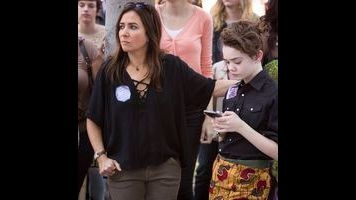But in “Woman Is The Something Of The Something,” Sam has the opportunity to be a leading lady even if she doesn’t know it. Zach (Zach Woods) and Danny (Danny Pudi) are casting their sitcom, and Sam’s name gets thrown into the mix. “Sam Fox, I used to masturbate to her,” Zach says. Soon, Sam is their best and only choice for their artistic masterpiece. But Sam is none the wiser, because her manager Tressa (Rebecca Metz) knows how fleeting these parts can be and refuses to tell Sam that her life could change drastically due to something completely out of her control. So, instead Sam goes about her daily, far-from glamorous life, having something as a seemingly banal as checking smoke detectors in her underwear turn into complete and total chaos that calls her parenting skills into question. When the army of teens emerged from Max’s room and Sam cried “Where did all those people come from?” I had one of the biggest laughs I’ve had during the show’s run. Better Things isn’t about the joke set-ups. It’s in these small moments that the laugh lines emerge.
The centerpiece of the scenes in which Sam living her life in ignorance of the incredible part she could have is when she and Sunny go to the plastic surgeon for a consultation on a facelift. It’s not that she’s against the idea of plastic surgery — for her art or for her integrity as an actress. She just doesn’t want to look weird (“You will not leave looking like a shiny potato head”) or pay $100,000 for a three week recuperation time and the potential to look “fresh.” “What would you tell the girls?” Sunny asks about how Sam would explained a bruised face for three weeks. “I’ll just tell them I got attacked. At then they won’t be mad at me. They’ll be nice to me at least for a day, maybe,” Sam replies. It’s pragmatism that stops her, not principles. We think of women in Hollywood as constantly striving for a certain degree of fuckability, but this episode gave a view of the work-life balance for an actress on Sam Fox’s level of fame. Sure, plastic surgery would make her feel good and might help her career, but she also needs to live her life and being out of commission for three weeks, a $100 grand poorer, is not worth it. Especially when, unbeknownst to Sam, her job prospects are at the mercy of casting directors, studio heads, and managers and she has no control over them at all. Because when it comes down to it, the Rachel McAdams’ of the world are always going to beat Sam out for the part.
Sam’s been beat out for parts now by McAdams, deciding perhaps she’d give TV another a go after the horrorshow that was Season 2 of True Detective, and Julie Bowen, who presumably got cast ahead of Sam and Constance Zimmer in the pilot. Juliie Bowen and Rachel McAdams are pretty much diametric opposites from Sam when it comes to type. These women play love interests and leads, while Sam plays the best friend type, as Tressa reiterates to her. While it seems like an exaggeration to believe that a woman who looks and acts like Julie Bowen would compete for the same part that Sam Fox tries out, there seems to be a nugget of truth that in the portrayal. No matter the part, there’s always the chance to get beaten by Rachel McAdams.
This idea that women are interchangeable in Hollywood, and will essentially always be beat out by the more fuckable candidate, is contrasted by the episode’s bookended scenes that deal with the thanklessness of womanhood. In the opening scene, Sam talks to a homeless woman who commiserates with her about how hard being a mom is. You give everything, including a full night’s sleep — “I call it Momstein-Barr” — in order to raise children who think you should call dad anytime there’s a hint of problem, including defective smoke detectors. Motherhood is something she can throw her an entire effort into, this potential lead, she couldn’t, and neither seem to be working out particularly well for her. Yet, in the end, the ultimate joy she gets is not from landing the gig, it’s for her ability to be there for Frankie when she didn’t think she could be. Motherhood is thankless, but it can also feel pretty great, too.









































